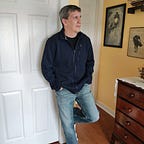Better Science Classes, Better Citizens
The mission of public schools should be inspiration not inculcation.
How many of us remember feeling wonder and awe in our high school science classes? Who recalls when our biology teacher taught us how our very existence hinged on a happenstance whose statistical likelihood was so small it’s a miracle we’re even here to consider it? Or when our earth science teacher pointed out the innumerable variables at play in the solar system that make life on Earth possible?
Not many, I’m guessing.
Instead, what most people seem to remember of their high school science days are long lectures, endless notes, lists of vocabulary words with long definitions, and tests, tests, tests. Any wonder or curiosity about the subject was squelched the moment we realized how hard and boring the class was going to be.
It needn’t be this way.
Even in this high-stakes, standards-driven era of education, science should be the most exciting, controversial, and thought-provoking class. One of the problems in our schools today is declining time spent on science education, particularly in the elementary grades. Another, however, is when science is taught in a rote manner from a text book or lecture notes — as though curiosity is the weed and science the Round-Up.
And that’s the problem.
It was only after high school — when I’d bleached my brain of school jargon and mandatory readings and seemingly pointless study notes — that I began to feel my interest in science take shape again.
What happened?
I found out that scientific discoveries were actually pretty cool. No, really. Science writers could make almost anything exciting and interesting by distilling the wonky information down to an accessible level. Moreover, popular science articles are usually written in a loose narrative structure, with the focus at least partly on the person or a team of scientists. You get to know not just the facts but the people behind the facts.
This point should not be lost on public school teachers.
Let modify our teaching of science to start focusing more on the scientists and researchers who pioneered the greatest scientific achievements — many of whom came from diverse ethnic backgrounds —and who fought discrimination and other social barriers. I am not suggesting that every science class become a lesson on critical race theory. Rather, I wish young people to know that today’s scientists were once young like them, dreaming and imagining themselves as part of something greater, and working hard to make that dream come true.
Hopefully, many of our students today will be future Discover and Scientific American readers. But our classrooms are also comprised of English majors, writers, engineers, mathematicians, artists, and budding young tradespeople. There’s no reason why there can’t be engaging content for everyone. We just need to remember that most people are more interested in the beauty of the forest than the details of the trees. Let’s not forget, for example, that science and art frequently intersect, and in the process shape the careers of both scientists and artists.
Science Is Inspiring
We all love BIG ideas. Children are born with natural curiosity and inductive reasoning skills. They watch, listen, learn, and reason a problem out through asking questions and trying to engage with the big picture.
Teaching a physics course and hoping to get your students interested in gravity? Start off with a video, discussion or illustration of what would happen to a body that fell into a black hole. Invariably, questions arise, as they always do in my fifth grade astronomy club, about the forces at work. And then more questions follow. As a matter of fact, it might not be a bad idea to structure your science class as an extracurricular, an environment in which students frequently feel more active in their learning
You’ll be surprised what ideas spring forth from their fevered brains when confronted with awe-inspiring content. Using this, you can springboard into your lesson or linger over these “teachable moments,” which often are the most interesting part of any class.
Keep the latest discoveries front and center in your science class. A bulletin board or some other display dedicated to the latest discoveries should be front and center in every science classroom. Encourage the students to add to it and even share their learning and what fascinates them with their classmates. Call it a “science community board” and feature articles and images from other related disciplines, so students can see how it all integrates.
A Science Education Teaches You to Think
Hands-on science experiments are great, and we educators all know that. They are useful in showing a concept in action and kids love them. However, students don’t always need to keep their hands busy if their minds are actively engaged. Set aside time each week in your class to have a discussion, Socratic seminar, or a debate about a prominent but controversial theory or subject in science. This is a teacher’s chance to glimpse what students are thinking and implicitly teach critical thinking and how scientists skeptically view popular notions such as UFOs or Intelligent Design, for instance.
This is not to say we should tell students what to think. But we should model critical analysis in implicit ways and encourage healthy, robust discussion. We can simultaneously require students to use the vocabulary we’ve taught so they can participate in healthy, rational discourse — a skill many youth are lacking in today.
We want them to love learning science; the ability to take fastidious notes and memorize definitions is secondary. In our participatory democracy, we need more citizens with an educated point of view on science matters who can think critically and skeptically for themselves. Climate change and its effects on our planet is just one major problem facing future generations that will require many bright minds to solve.
Subscribe to Insights from Educate for a midweek dose of professional learning and inspiration from authentic voices in education.
